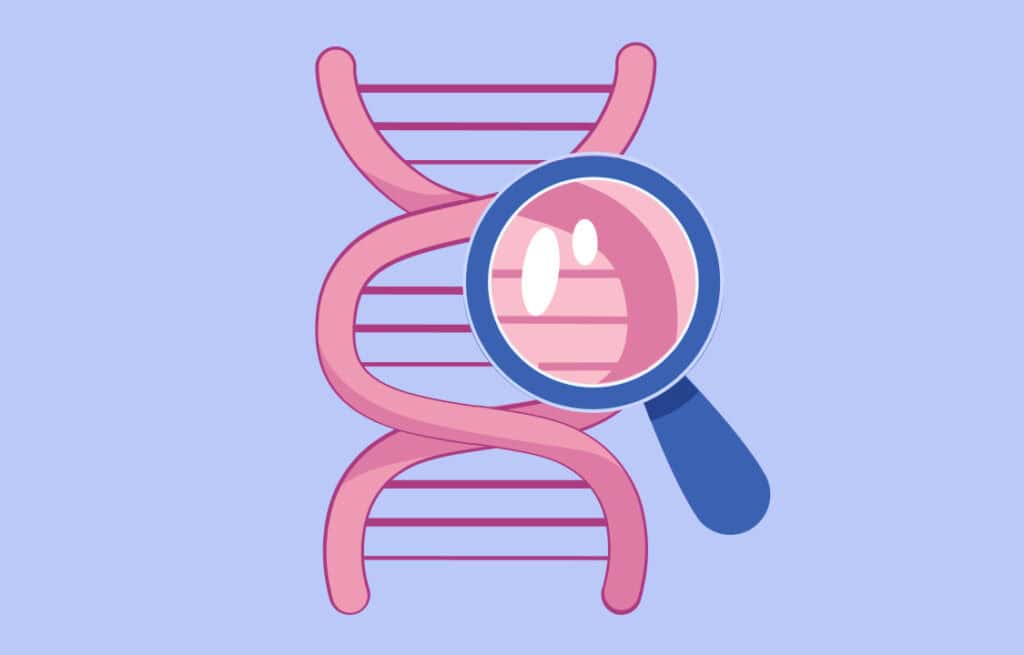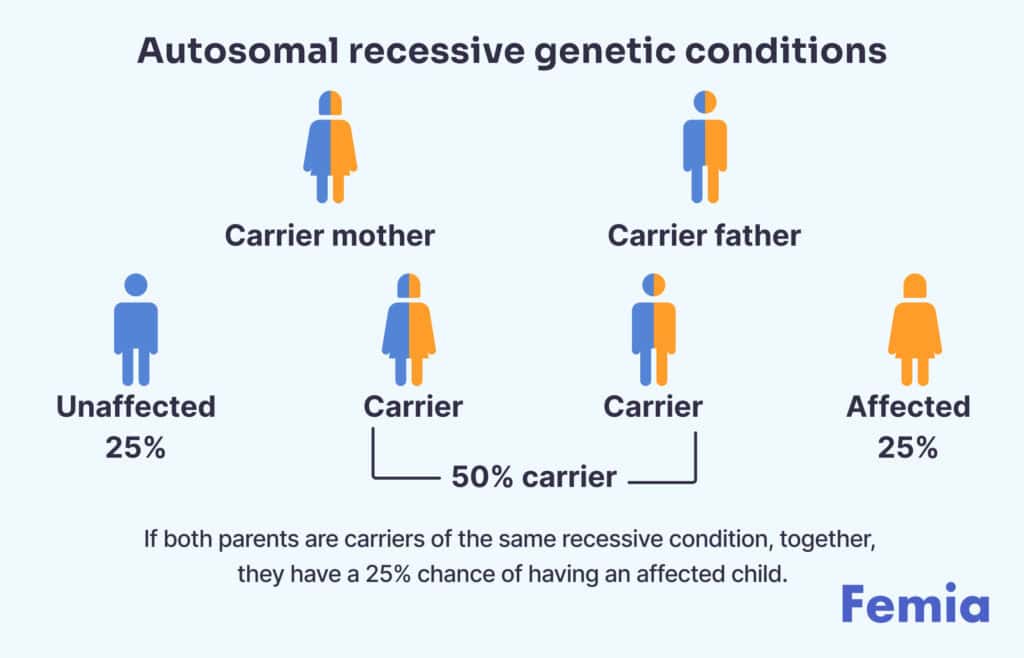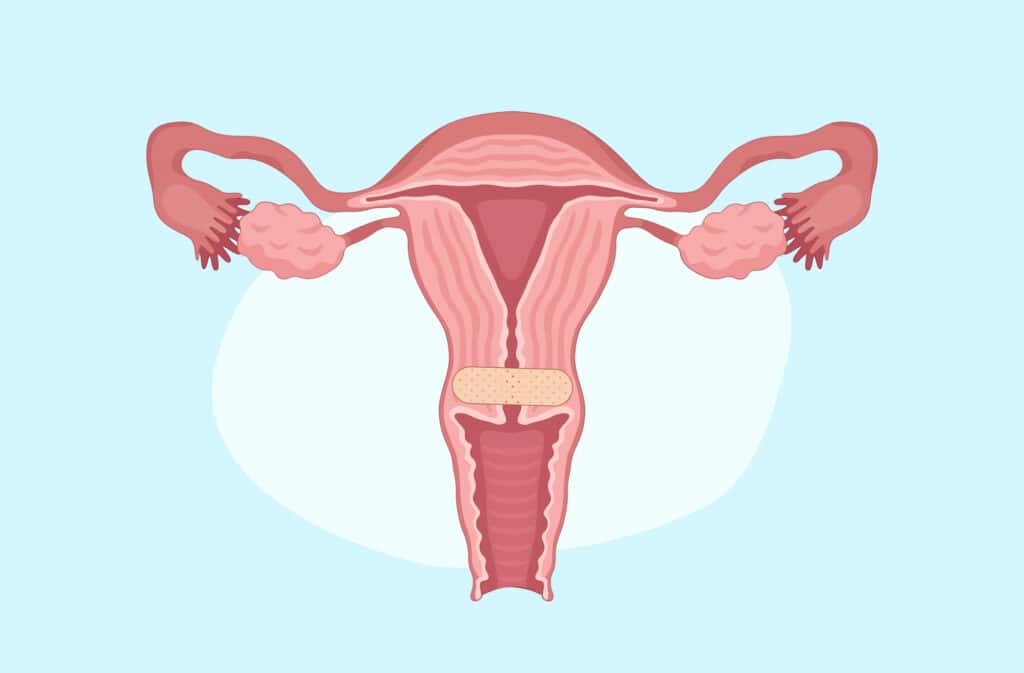Femia > Health Library > Getting Pregnant > Planning pregnancy > Thinking about conception? Genetic testing before pregnancy explained
Genetic testing before pregnancy: Importance, types and benefits for conception

- Updated Feb 10, 2025
- Published
CRAFTED BY HUMAN
Crafted by human At Femia, we provide accurate and up-to-date information at every stage of your journey, from trying to conceive, pregnancy and postnatal support. All content is created by a real person based on in-depth research and own professional experience. Femia ensures that you will receive expert advice, strict accuracy and a personalized approach from our authors/medical experts. Learn more about our editorial policy.
FACT CHECKED
Fact checked At Femia Health, we maintain the highest standards of editorial excellence in delivering content focused on helping you conceive, guiding you through pregnancy, and supporting you postpartum. Explore our content review principles to learn how we ensure the accuracy and quality of our health and lifestyle tips for every stage of your journey.
Genetic carrier screening can check whether you have a gene for a particular genetic disorder. It is a great way to assess the chances of passing on genetic diseases to your future children. Discuss testing options with your trusted healthcare provider, and have a licensed genetic counselor help you understand the test results.
Have you ever wondered if you will have the same disease as one of your family members? Or whether your parents passed the grounds for some health conditions on to you? With the advancement of medicine and genetics, there is no need to wonder. You can remove all uncertainties by undergoing genetic carrier screening.
One of the best uses of genetic testing is for family planning. Think of pre-testing as a sneak peek into potential health risks for your future children. This provides peace of mind and, most importantly, an opportunity to take proactive steps for your baby’s health. If you can, why not make the best use of modern technology, and start making informed family planning decisions?
What is genetic carrier screening?
Genetic carrier screening is a test used to see if a person carries a gene for a particular genetic disorder.
How does this work? Well, you have a custom set of genes that carry information on how to make you, you. They determine how to put together proteins, which are used to build your entire body and help it run smoothly.
Genes decide the color of your hair and eyes, the shape of your nose, and whether you develop a particular genetic disease. For each genetic trait, you get one gene copy (allele) from your mother and one from your father. Some genetic diseases develop when only one of the alleles is affected (also known as dominant disorders), while others require both gene forms to be affected (recessive disorders).
Therefore, you could carry one affected gene for an autosomal recessive genetic disease and have no idea about it, because your other gene is keeping you healthy. The issue is, even if you don’t display any traits of the affected gene, you can still pass it on to your child.
That is where genetic carrier screening comes into play. The test analyzes your genes and reveals the likelihood of having a child with a genetic disorder. According to the National Society of Genetic Counselors’ practice guideline, the results of both parents should be considered together.

Pre-pregnancy testing: why it matters
Genetic carrier testing makes a great ally in family planning. If done before conception, it can inform you about pregnancy risks, help you make informed decisions, and reduce the chances of passing on hereditary diseases to your future children.
If both partners carry mutated genes for a genetic disorder, there is a high risk of passing on the disease to a child, even if the parents don’t have any symptoms. This might seem like an unsolvable situation, but there might be ways to go around it.
Not only does genetic carrier screening give you various options to consider, but it also grants you more time to think. Here are some possible approaches:
- Get pregnant and perform prenatal tests to check the fetus;
- Use in vitro fertilization (IVF) and do genetic testing on the embryo before transferring it to the uterus;
- Use donor genetic material to get pregnant;
- Choose not to get pregnant;
- Choose to adopt a child.
Femia offers the most accurate tool for determining ovulation and fertile days
@femia.fertility It's best to start getting ready for pregnancy even before you start trying. Don't worry, we will help you do everything correctly and quickly ❤️#pregnancy #ttc #ttccommunity #ttcover30 #motherin35 #getpregnant #fertilityawareness #preparetopregnancy ♬ original sound - Femia fertility tracker
What are the different types of genetic carrier screening?
There are different kinds of carrier testing depending on the scope of genetic diseases tested:
Specific condition testing. This can be done if your family history suggests that you might carry a gene for a particular condition.
Targeted carrier screening. Usually checks for a limited number of disorders. Some conditions are more common in people of certain races and ethnicities, such as sickle cell disease in African American people or Tay–Sachs disease in Eastern or Central European Jewish, French Canadian, and Cajun people.
Expanded carrier screening. These tests check for a broad range of genetic disorders, often hundreds of conditions, regardless of your race and ethnicity.
👉Find out more: How to boost fertility: 7 natural ways to increase your chances of getting pregnant
What conditions does genetic carrier screening test for?
Genetic carrier screening tests for the most common and severe genetic conditions. Here is an overview of the diseases that most targeted tests check for:
- Cystic fibrosis: a recessive genetic disorder caused by a mutation in the cystic fibrosis transmembrane conductance regulator (CFTR) gene. It is marked by the production of thick and sticky mucus. The disease targets the lungs, pancreas, and many other organs. The lungs are particularly affected, as sticky mucus can often clog the airways and trap microbes.
- Sickle cell disease: a recessive genetic disorder caused by a mutation in the gene that codes hemoglobin. Hemoglobin is an iron-containing protein that carries oxygen within the red blood cells. Normal red blood cells are round and flexible, so they can easily move through small blood vessels. In sickle cell disease, they become stiff and C-shaped, often getting stuck in tiny blood vessels. Their life span is also shorter compared with healthy red blood cells.
- Tay-Sachs disease: a recessive genetic disorder caused by a mutation in the HEXA gene, which codes for a very important enzyme that breaks down a potentially toxic substance found in the neurons. When the enzyme is not working properly, this substance accumulates at high levels. The disease manifests as muscle twitches, difficulty swallowing, vision and hearing loss, intellectual disability, and developmental problems.
- Spinal muscular atrophy: a recessive genetic disorder caused by a mutation in the gene that codes a motor neuron protein. It affects the nervous system and voluntary movement of muscles.
- Fragile X Syndrome: a genetic disorder caused by a mutation in the gene that codes for a protein called FMRP. Usually, male children are more severely affected by this syndrome compared to girls. The disease manifests as developmental problems, problems with learning, and intellectual disability.
Preconception genetic testing: what to expect
A great place to start is discussing the idea of genetic carrier testing with a trusted, licensed healthcare professional, like your obstetrician.
They might refer you to a genetic counselor who will guide you through the process: assessing your personal and family history, advising you on which test to choose, helping you understand the results, and suggesting the next steps to take in your family planning. You can also search for a genetic counselor using the National Society of Genetic Counselors directory or the American College of Medical Genetics and Genomics directory.
The test is usually performed on a sample of blood or saliva. This biological material is used to analyze your genetic material for the presence of mutated genes. The results will come back negative (if you do not have the mutated version of a gene) or positive (if you do have the mutated version of a gene).
In most cases, the partner with greater risk is tested first. If that person is not a carrier, there is usually no need to test the other partner. If the test results come back positive, the other partner needs to be tested, too.

Genetic testing for autism before pregnancy
Is it possible to do genetic testing for autism before pregnancy? Not quite.
Autism is one of those disorders caused by both genetics and environment. Such disorders are known as multifactorial, as opposed to typical genetic disorders. In the case of a condition being inherited in complex ways, genetic carrier testing can only provide limited information.
Many genes are potentially related to a child developing autism, primarily the genes that determine the development of the brain. It is possible to screen for those genes, but that does not mean a person will express any symptoms. This greatly diminishes the value of genetic carrier testing for autism.
What other causes play a role in autism development? Environmental factors like exposure to chemicals and medications, infections during pregnancy, older maternal age, and complications during delivery are all often associated with the development of autism.
So, the cause of autism is as complicated as the condition itself. It is a mix of factors that cannot be assessed so easily. Therefore, genetic carrier screening for autism is not a standard practice before pregnancy.
Benefits and limitations of genetic carrier screening
Going for genetic carrier testing is a great way to kick off your family planning, but there are some drawbacks to consider.
Benefits of pre-pregnancy testing:
- Preconception genetic testing offers insight into the potential health status of your baby even before conception. It gives you a chance to make empowering decisions based on modern, evidence-based medicine.
- If you and your partner both happen to be carriers of a particular gene, knowing about it gives you the chance for early intervention. Using alternative conception methods like IVF might increase the chance for you to still have healthy babies.
- Simply knowing the odds and risks allows you to prepare to manage potential health issues.
Limitations of pre-pregnancy testing:
- As with most tests, false positive and false negative results can happen. It’s very important to consult with a trusted genetic consultant who will know how to accurately interpret your results.
- Expanded carrier screening panels may test for hundreds of disorders, but they cannot detect all without exception. Some genetic disorders are caused by several mutated gene forms, and not all can be covered by the screening.
- Receiving the results might be psychologically stressful, especially when faced with difficult reproductive choices. Seek emotional support from your partner, and discuss ways to handle the pressure.

Steps to take before genetic carrier screening
Are you seriously considering the idea of pre-pregnancy testing? Here is what you need to do first.
1. Consult with a healthcare provider
Your healthcare provider is the best person to consult about genetic carrier screening. Along with answering all of your testing-related questions, they can assess your health status and review your medical history. Your provider will give you practical guidance on the next steps and discuss different test options.
2. Understand the risks
No one is immune to having a child with a genetic disorder. Complex factors come into play: your genetic makeup and the unique way it combines with your partner’s genes. Even if you fall into the low-risk group, there is no guarantee that your child will be healthy. By performing preconception genetic testing, you can understand the risks better and significantly reduce the chance of passing on a genetic disorder to your babies.
Femia offers the most accurate tool for determining ovulation and fertile days
3. Choose the right test
Choosing the right genetic carrier screening test increases your chances of detecting the genetic disorder of interest. Most often, people go for targeted tests that evaluate disorders commonly found in their racial or ethnic group.
However, a comprehensive panel covers a much wider range of genetic mutations and might detect conditions that are not related to race or ethnicity. According to the National Society of Genetic Counselors’ practice guideline, expanded carrier screening gives better results compared to race and ethnicity-based tests.
Still, the right test will depend on your individual health condition. A genetic counselor can help you select the most appropriate test based on individual risk factors and family history.

Questions from the Femia community
How accurate are genetic carrier screening tests?
Pre-pregnancy testing is highly accurate, but no test provides 100% definitive results. There is a slim chance of getting false-negative results when you do have a gene for a genetic disorder, as well as getting false-positive results when you don’t actually carry the gene.
Understanding the genetic carrier screening results is no easy task: it is best to consult with a genetic counselor who has extensive experience in interpreting test information and detecting false-negative and false-positive results.Can genetic carrier screening detect all genetic disorders?
Targeted genetic screening evaluates only the disorders that are typically seen in a particular racial or ethnic group. Expanded genetic carrier screening tests for a much broader range of genetic disorders.
<p><br>However, no test can cover all genetic disorders and gene variations. Genetics is not at all simple: some disorders are caused by mutations of one gene, while others arise as a result of multiple mutated genes. And, some diseases are caused by more than one mutated variation of the same gene, so it’s hard to keep track of all possible mutations. New disorders or less common genetic mutations may not be a part of the existing testing panels.Is genetic carrier screening necessary for everyone?
No, genetic carrier screening is not necessary for everyone. However, it is highly recommended for couples planning a pregnancy and wanting to assess the risk of hereditary disease.
Preconception genetic testing is also highly recommended for those with a known family history of genetic disorders, history of infertility, multiple miscarriages, or previous stillbirth. If you have had a previous pregnancy or child affected by a birth defect or genetic condition, it is a good idea to have a genetic carrier screening test.
What if I’m already pregnant and didn’t do genetic carrier screening?
If you are already pregnant and did not do genetic carrier screening, don’t worry. Carrier testing can still be done during pregnancy. But, you may also be a candidate for prenatal testing, which is performed on the fetus and may provide more definitive results. It is best to discuss your options with a healthcare provider.
The bottom line
If you are thinking about starting a family, genetic carrier testing should be part of the pregnancy preparations. It will give you not only peace of mind, but also a sense of control over the outcomes.
Although the testing is not mandatory, it is highly recommended for couples who belong to high-risk groups, like those having a family history of a genetic disease or belonging to a particular ethnic group. A healthcare provider can help you choose the most appropriate testing panel.
If you do not have specific indications for testing, you can select the panel that you find most useful. Still, the test should be prescribed and interpreted by a genetic counselor. Knowing that you and your partner share mutations in the same genes may unlock new reproductive approaches, like IVF with genetic testing before implantation.
References
- “About Cystic Fibrosis | Cystic Fibrosis Foundation.” Cystic Fibrosis Foundation, https://www.cff.org/intro-cf/about-cystic-fibrosis. Accessed 23 June 2024.
- “About Sickle Cell Disease.” CDC – Centers for Disease Control and Prevention, 22 May 2024, https://www.cdc.gov/sickle-cell/about/index.html.
- “Carrier Screening.” ACOG – The American College of Obstetricians and Gynecologists, https://www.acog.org/womens-health/faqs/carrier-screening. Accessed 19 June 2024.
- CDC. “Genetic Counseling.” CDC – Centers for Disease Control and Prevention, 17 May 2024, https://www.cdc.gov/genomics-and-health/about/genetic-counseling.html.
- “Fragile X Syndrome.” MedlinePlus, https://medlineplus.gov/genetics/condition/fragile-x-syndrome/. Accessed 23 June 2024.
- “Genetics Basics.” CDC – Centers for Disease Control and Prevention, 17 May 2024, https://www.cdc.gov/genomics-and-health/about/index.html.
- Hodges, Holly, et al. “Autism Spectrum Disorder: Definition, Epidemiology, Causes, and Clinical Evaluation.” Translational Pediatrics, vol. 9, no. Suppl 1, Feb. 2020, pp. S55–65. PubMed Central, https://doi.org/10.21037/tp.2019.09.09.
- “Prenatal Genetic Screening Tests.” ACOG – The American College of Obstetricians and Gynecologists, https://www.acog.org/womens-health/faqs/prenatal-genetic-screening-tests. Accessed 23 June 2024.
- Sagaser, Katelynn G., et al. “Expanded Carrier Screening for Reproductive Risk Assessment: An Evidence-Based Practice Guideline from the National Society of Genetic Counselors.” Journal of Genetic Counseling, vol. 32, no. 3, 2023, pp. 540–57. Wiley Online Library, https://doi.org/10.1002/jgc4.1676.
- “Spinal Muscular Atrophy (SMA).” Muscular Dystrophy Association, 18 Dec. 2015, https://www.mda.org/disease/spinal-muscular-atrophy.
“Tay-Sachs Disease.” MedlinePlus, https://medlineplus.gov/genetics/condition/tay-sachs-disease/. Accessed 23 June 2024.

How can your cervix get bruised and what are the telltale signs? Learn how to recognize bruised cervix symptoms after sex and know when to seek help.

Learn about chemical pregnancy symptoms, causes, and frequency. Discover how to recognize this early pregnancy loss and when to seek medical help. Expert advice from Femia.

Discover how to get pregnant with blocked fallopian tubes in 7 steps. Learn about symptoms, treatments, and success stories. 30% of women face this – find hope and solutions here!

